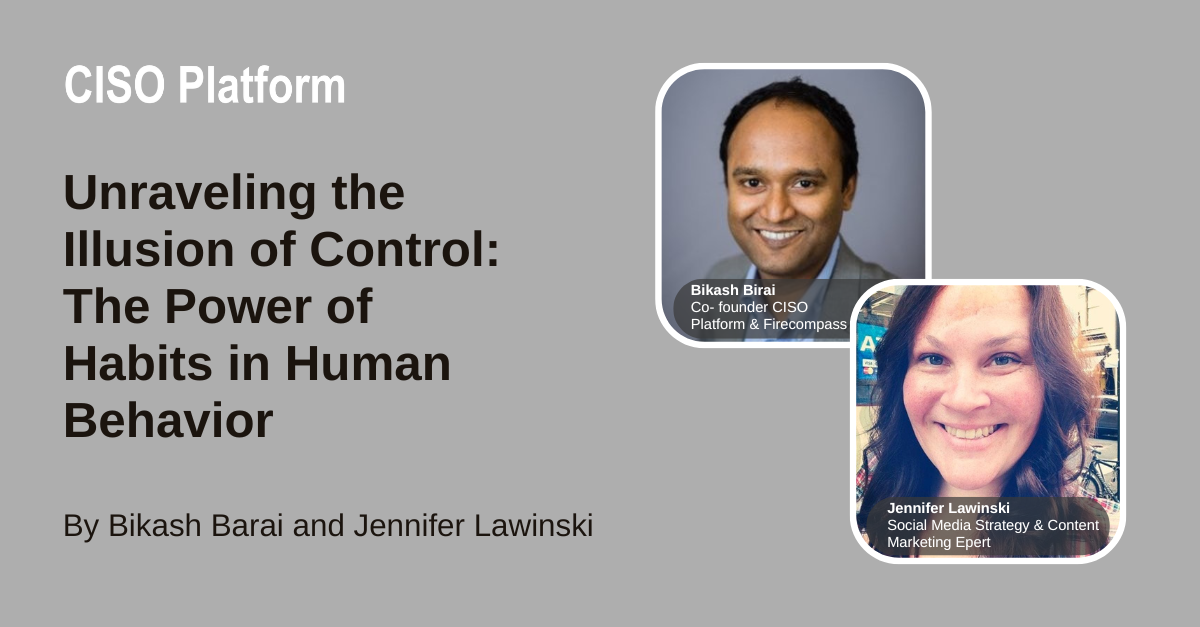Welcome, esteemed attendees of the RSA Conference, to a discourse on a fundamental truth often obscured by the veneer of consciousness: our lack of control over our own actions. Despite our fervent belief in our autonomy, the reality is that much of our behavior is dictated by deeply ingrained habits that operate beneath the surface of our awareness. Join me as we delve into the intricate structure of human habits and explore how understanding this phenomenon can revolutionize our approach to IT security.
Here is the verbatim discussion:
The central theme is that we are not in control even though we would love to think that we are in control but we are not and I I would explain the the basic structure of a human habit and if you look at the kind of things which we do in our day-to-day life around 40% of the things which we do we do it unconsciously I'll give an example like tying up the shoelace or driving the car changing the gear all these things we do without thinking if you think tying a shoelace is quite complex right but we do it without thinking or just imagine you are in an elevator and and you are thinking of something mentally engrossed in some thought and the elevator door opens at the wrong floor what happens we just step out right because that's an automated program in our mind to step out when the door opens so we have a lot of these programs in our mind which are kind of inbuilt and which get triggered automatically every time there's that right trigger so one part of my talk is in terms of understanding the structure of human behavior or human habits so basically uh there are three parts one is the trigger then there is a routine and then there is a reward so we all respond to things in uh a specific way when the trigger happens and interestingly uh there are these companies uh like Coca-Cola and and Facebook and Google.
Highlights:
The Illusion of Control: Despite our desires to believe otherwise, research indicates that a significant portion of our daily actions occur on autopilot, driven by habit rather than conscious deliberation. From mundane tasks like tying shoelaces to complex behaviors like driving a car, approximately 40% of our actions are executed unconsciously. This realization challenges the notion of human agency and underscores the powerful influence of habit in shaping behavior.
Decoding the Structure of Habits: At the core of human habits lies a triad of components: the trigger, the routine, and the reward. When confronted with a particular cue or trigger, our brains instinctively initiate a predetermined routine, culminating in a reward that reinforces the behavior. This cyclical process forms the bedrock of habit formation, dictating our responses to stimuli in a predictable manner.
Insights from Corporate Giants: The ubiquity of habit-driven behavior extends beyond individual actions to shape the strategies of corporate behemoths like Coca-Cola and Facebook. Through meticulously crafted triggers, routines, and rewards, these companies engineer addictive products and experiences that compel users to engage with their platforms habitually. By leveraging insights from behavioral psychology, they exploit the innate tendencies of human cognition to drive desired outcomes.
As we reflect on the interplay between habit and human behavior, it becomes evident that our perceived agency is but an illusion, overshadowed by the omnipresent influence of habit. By unraveling the intricacies of habit formation and acknowledging our susceptibility to its sway, we can unlock new avenues for promoting IT security within organizations. Rather than relying solely on awareness campaigns, let us harness the power of habits to instill secure behaviors seamlessly and unconsciously. In doing so, we can fortify our defenses against cyber threats and navigate the digital landscape with heightened resilience. As we depart from this discourse, let us carry forth this newfound understanding and usher in a paradigm shift in our approach to cybersecurity.
Speakers:
Bikash Barai is credited for several innovations in the domain of Network Security and Anti-Spam Technologies and has multiple patents in USPTO. Fortune recognized Bikash among India’s Top 40 Business Leaders under the age of 40 (Fortune 40-under-40).Bikash is also an active speaker and has spoken at various forums like TiE, RSA Conference USA, TEDx etc.Earlier he founded iViZ an IDG Ventures-backed company that was later acquired by Cigital and now Synopsys. iViZ was the first company in the world to take Ethical Hacking (or Penetration Testing) to
the cloud.
https://twitter.com/bikashbarai1
https://www.linkedin.com/in/bikashbarai/
Jennifer Lawinski Editor-in-Chief of online engagement for RSA Conference. With experience writing for publications like CRN and CIOInsight, Jennifer has the experience to facilitate the important security conversations. Keep an eye on this space. I am excited to see what the next phase of RSAC 365 will look like.
https://www.linkedin.com/in/jenlawinski


Comments